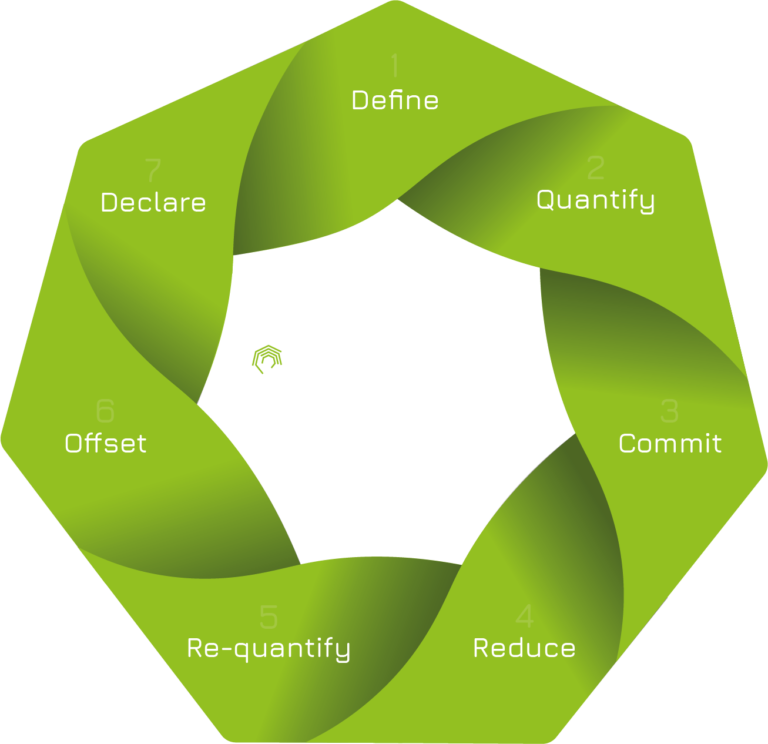As climate change and its impacts continue to be an ever-present concern globally, businesses are playing a crucial role in developing and implementing strategies to mitigate their environmental footprint.
One such target that companies are increasingly aiming for is carbon neutrality, demonstrating their commitment to balancing out the carbon emissions they produce with appropriate carbon reduction efforts. Aligning with the PAS 2060 standard is an effective way for businesses to demonstrate their dedication to achieving carbon neutrality.
In this in-depth guide, we will explore the requirements and benefits of PAS 2060, detailing the certification process and offering insights into how your business can demonstrate its commitment to sustainability and carbon neutrality.
Understanding the PAS 2060 Requirements
To attain PAS 2060 verification, businesses must adhere to a rigorous set of requirements outlined in the standard. These requirements provide a clear roadmap for organisations to reduce their carbon footprint and achieve credible carbon neutrality claims. Here, we will discuss the primary requirements underpinning the PAS 2060 standard.
1. Quantification of Greenhouse Gas Emissions
The first step in the PAS 2060 process involves quantifying your organisation’s greenhouse gas emissions using the ISO 14064-1 — an internationally recognised emission measurement standard. This process entails identifying and calculating your business’s direct (Scope 1) and indirect (Scope 2 and Scope 3) emissions to establish a comprehensive carbon footprint.
2. Setting Carbon Reduction Targets
Once your organisation’s carbon footprint is established, the next step is establishing time-bound, quantifiable targets for reducing emissions. These targets should be grounded in scientific consensus and aligned with global commitments like the Paris Agreement to ensure your business contributes effectively to climate change mitigation efforts.
Furthermore, businesses must develop a Carbon Reduction Plan to demonstrate concrete actions and strategies for achieving the set targets.
3. Implementing Emission Reduction Measures
To accomplish their carbon reduction targets, businesses must implement tangible emission reduction measures. These actions vary across industries and may include adopting energy-efficient technologies, investing in renewable energy sources, streamlining transportation logistics, and promoting a circular economy.
4. Utilising Carbon Offsets
Despite undertaking measures to reduce emissions directly, businesses may still have unavoidable emissions. In such cases, organisations can purchase carbon offsets from verified projects that reduce or sequester greenhouse gas emissions, effectively counterbalancing their residual emissions.
Carbon offsetting projects span various sectors, including renewable energy, reforestation, and methane abatement.
5. Maintaining Transparency and Credibility
Lastly, PAS 2060 certification necessitates organisations to maintain strict transparency and credibility in their carbon neutrality claims. Businesses must provide public declarations of their commitment and validate their carbon calculations, reduction targets, and achievement of carbon neutrality using independent third-party verifiers.
The Benefits of Achieving PAS 2060 Certification
Beyond the direct environmental impact of reducing greenhouse gas emissions, attaining PAS 2060 verification carries additional far-reaching benefits for businesses. Some key advantages include:
1. Enhanced Brand Reputation
PAS 2060-certified companies showcase their commitment to addressing climate change and overall social responsibility. This achievement bolsters your brand’s reputation, attracting environmentally-conscious customers and partners.
2. Competitive Advantage
As sustainability becomes increasingly important in the eyes of consumers, investors, and regulators, achieving carbon neutrality can grant your business a distinct advantage over competitors that have not yet adopted similar measures.
3. Operational Efficiency Improvements
Implementing carbon reduction measures often unveils opportunities to enhance operational efficiency—such as reducing energy consumption or minimising waste—resulting in cost savings and increased profit margins.
4. Improved Stakeholder Relations
Demonstrating a dedication to carbon neutrality fosters a positive image among shareholders, employees, and investors, who appreciate organisations that contribute to global sustainability efforts.
The PAS 2060 Verification Process
Achieving PAS 2060 verification is a comprehensive, step-by-step process that requires vigilance, commitment, and a clear understanding of your organisational carbon footprint. The key stages of this process include:
1. Measuring and Reporting Greenhouse Gas Emissions
Establish a baseline carbon footprint incorporating Scope 1, 2, and 3 emissions, and develop a transparent and consistent reporting method for ongoing data management.
2. Formulating a Carbon Reduction Plan
Outline your emission reduction targets and strategies, establishing a foundation for measuring progress and ensuring accountability.
3. Implementing Emission Reduction Measures
Integrate emission reduction measures into your operations to achieve the set targets, which may involve altering practices, investing in technology, or adopting new innovations.
4. Attaining Third-Party Verification
To ensure credibility and authenticity, employ independent verifiers to validate your carbon neutrality claim, emission calculations, and progress in achieving reduction targets.
Final Thoughts
Achieving PAS 2060 certification and demonstrating a commitment to carbon neutrality is an essential step for businesses looking to secure their place in a low-carbon, sustainable future. This guide has provided a comprehensive overview of the importance of PAS 2060 for businesses and outlined the requirements, benefits, and process of attaining certification.
With this knowledge and Carbonology® working with you, your business can begin its journey towards a more environmentally-conscious, sustainable, and prosperous future. If you want to learn more about our carbon-neutral verification, book a call today!

